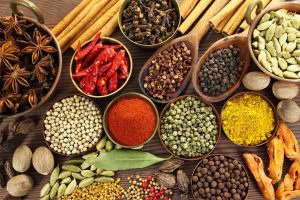Indian kitchen is incomplete without a variety of essential spices. All that is there inside a spice case in an Indian kitchen consists of plentiful of health benefits.
Indian spices along with altering the taste of the food, consist of innumerable medicinal benefits. Spices rather play an important role in medicinal, cosmetic, pharmaceutical and perfumery, and many more. Spices also play a major role in curing diseases like, diabetes, cardiovascular diseases, arthritis, cancer and AIDS.
Let us discuss 7 such spices which play a great role in enhancing the taste of the food and along with having multiple health benefits:
Turmeric – known to improve heart health, prevent Alzheimer’s and cancer
Turmeric (Curcuma longa) is a member of the curcuma botanical group. It is used as an anti-inflammatory agent to treat gas, colic, toothaches, chest pains, and menstrual imbalance. It is a prominent medicine and it acts as an antibiotic for healing of injury and removal of scars and it is used in cosmetic treatment as well. It is one of the best, easily available and cheapest remedies for pigmentation. It is the most well-known therapeutic herb, with attributes of cancer prevention agent.
Cumin – known to improve digestion and acts as memory booster
Cumin (Cuminum cyminum) is a part of spice, since it holds volatile oil that provides an aroma to its seeds. It also helps to get rid of various diseases like tooth pain, dyspepsia, and jaundice as well. This spice is cultivated in many parts of India and is also exported to the international market in different forms like seeds, powder, essential oils etc. It consists of numerous remedial properties; therefore it is used by pharma industries as well.
Fenugreek – known to slow sugar absorption in the stomach and stimulate insulin
It is an herb long used in alternative medicine, it is also a common most ingredient in Indian dishes and often taken as a supplement. This herb also contains numerous health benefits. Fenugreek (Trigonella foenum-graecum) is a plant that stands around 2-3 feet (60-90 cm) tall. It has green leaves, small white flowers, and pods that contain small, golden-brown seeds. It has been used in Chinese medicine to treat skin conditions and other diseases. Fenugreek seeds are also highly beneficial for natural hair growth.
Coriander – known to treat skin inflammation and manage high cholesterol levels
You won’t find any Indian who doesn’t like coriander. Coriander is being used in Indian households since infinite times to enhance the taste and smell of the food. Most importantly coriander is a culinary spice that prevents food poisoning. It comes from the (Coriandrum sativum) plant and is related to parsley, carrots, celery etc. It is also used to flavor international dishes. Coriander has numerous health benefits like; lowering blood sugar levels, improving gut, heart and brain health. It also fights infections and protects skin.
Clove – known as reduce risk of developing heart disease, diabetes, and certain cancers
Clove (Syzygium aromaticum), is a tropical evergreen tree of the family Myrtaceae; small reddish brown flower buds of which are used as spices. Clove oil is especially known to bear medicinal properties. Clove oil is utilized in numerous torments like joints, muscles, or sinewy tissue, particularly rheumatoid arthritis. It can be used as a pain killer. It also helps to get rid of skin irritation, bacterial infections, acne and pimples etc.
Cinnamon – known to l ower Blood Sugar Levels and having Powerful Anti-Diabetic Effect
Cinnamon (Cinnamomum verum), also known as Ceylon cinnamon, is a bushy evergreen tree of the laurel family (Lauraceae) and the spice is derived from its bark. It is used to flavor meat dishes, rice and hot apple juice. Cinnamon’s medicinal properties help to treat sore throat, stomachic, tumors, fungal infections and spasms etc.
Cardamom – known to improve digestion problems including heartburn, intestinal spasms, irritable bowel syndrome, intestinal gas, constipation, liver and gallbladder complaints, and loss of appetite
Cardamom, also spelled Cardamon, spice consists of whole or ground dried fruits, or seeds, of (Elettaria cardamomum), a herbaceous perennial plant of the ginger family (Zingiberaceae). Cardamom plays a major role in recovering many diseases such as improving digestion, preventing vomiting, and helps in managing abnormally high blood pressure, asthma, diarrhea, colic, dyspepsia, epilepsy etc. It is additionally utilized for recovering cardiovascular, stomach-related, kidney-related diseases, lung-related issues, liver-related issues and many more.


